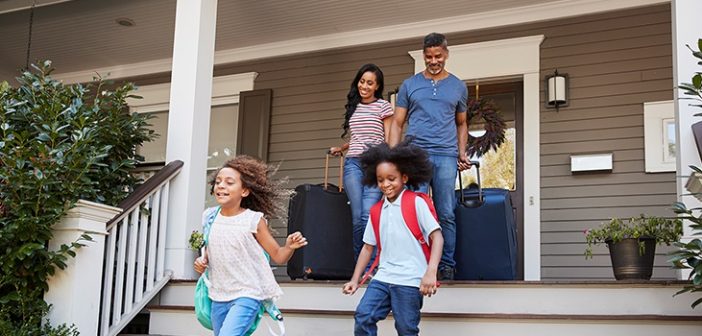There’s a long list of things to do when you’re getting ready to travel with family. But wherever you’re going, you’ll enjoy it more if you know that everything is okay at home. Reassurance is the key to a relaxing and enjoyable trip.
That’s why your pre-travel preparation should always include finding ways to keep your home secure while you’re gone. Here are some best practices to help you get started.
The first line of defense
Enlist friends, family, and neighbors for help. Let them know when you’ll be leaving, when you’ll be back, and how you can be reached. But also ask them to keep an eye out for anything suspicious.
Give a key to people you trust, and ask them to stop by occasionally. Better yet, sophisticated door locks now let you easily control access through your smartphone. There’s no need to hide or share a key.
Finally, keep your travel information close. Not everyone can be trusted, and nobody outside your personal circle needs to know that you’ll be gone.
Invite a new friend into your home
Family, friends, and neighbors play a crucial role because they know exactly what to do if something happens or if something doesn’t look right. You can also hire home guardians who can act as a house sitter if the previous options aren’t possible. But unless you feel comfortable having them house-sit, they’re not a 24/7 solution.
There’s one time-tested way to help keep your home secure around the clock while you’re gone: a top-rated home security system. That way, you’ve always got a “friend” at the house, even in the middle of the night.
Take advantage of high-tech
Traditionally, home protection systems have been relatively no-frills: a control panel, sensors on all points of entry, motion detectors, and a super-loud siren that goes off when an alarm gets triggered. Specialists at a monitoring station quickly assess and verify the situation, then notify the authorities immediately if necessary.
But the best home security systems are capable of so much more. For example, you can control your lights remotely from anywhere, making it look like you’re home. That’s extremely helpful, according to a study showing that 86 percent of burglars will do all they can to avoid running into an occupant.
What’s happening?
Video cameras have become a favorite must-add for millions of homeowners. The reason is simple: It’s scary to be unsure of what’s going on. Video streaming and recorded footage are now as close as your smartphone, and nothing’s more reassuring than having a real-time view of home.
Video doorbells are becoming a popular addition to home security systems as well. When somebody comes to the door, you’ll be notified via smartphone. Even if you’re halfway around the world, you can see who it is and speak with them.
The best part is, they’ll think you’re talking from inside your home, and most likely move on to another target.
More than burglars
Burglars aren’t the only threat to your home. A leaking water heater or broken pipe can cause tremendous damage if left unnoticed, typically causing thousands of dollars in damage.
A complete home security system will allow you to expand with leak and freeze sensors. Detection costs a fraction of a household disaster.
Is a monitored home security system important?
It’s tempting to use high-tech solutions to self-monitor your system through your smartphone. But when you’re away from home, there are considerable advantages to a professionally monitored home security system.
It’s hard to imagine, but your smartphone isn’t always an option. That’s especially true if you’re at the beach, on a plane, or in a rural area where cell coverage is spotty. A highly trained monitoring professional is always available to summon help, even when you’re not.
Hide your valuables
Even if a burglar does enter your home, they won’t want to hang around for long, especially if you do have a monitored home security system. Because time is short, they’ll typically head to the usual places, such as the living room, master bedroom, or home office.
Make it harder for them to make a quick raid by storing or locking up your valuables. Store items such as money, laptops, jewelry, electronic equipment and so on, and move them to an unusual place – for example, high up in a kitchen cabinet or under a bed in a child’s room.
Look outside
Not all protection happens inside the home. Discourage intruders by planting shrubs, bushes or other thick vegetation in front of all your ground-floor windows. A thorny shrub on the outside works perfectly with a window security sensor on the inside.
Also, trim back vegetation around your front door and make sure that there are clear sight lines from the street. The International Association of Certified Home Inspectors estimates that 34 percent of burglars enter through the front door, so don’t make it easy.
Let everyone know you’re protected
A home protection system is even more effective when you post a branded sign near your door, and stickers on your windows. It’s even better when you use a home security provider with a brand name that’s easy to recognize. Anything else might look fake.
Hold off on social media
Let’s face it: It’s fun to let everybody know about the cool places you’re visiting, and to post photos that keep them informed (and maybe just a little bit envious). But that’s one of the worst things you can do, since it can hang a “Nobody’s Home” sign for anyone who even casually follows your posts. As hard as it might be, wait until you get home to share the memories.
Make the most of your family vacation by taking easy steps that will help you be worry-free. They’re simple, cost-effective, and most of them work year-round to make your home more secure.
###
Robert Ogle is a writer and editor with seven years of experience in the home security industry. He currently is Senior Copywriter at Brinks Home Security, and was formerly editor of Security Nation magazine for the Electronic Security Association. With more than 1 million customers in the U.S. and Canada, Brinks Home Security is one of the largest providers of home security and smart-home solutions, as well as professional alarm monitoring. In addition to home security, Robert focuses on smart-home technology trends, as well as the impact of disruptive innovation. Connect with him on LinkedIn at linkedin.com/in/robertogle/





Thanks for posting this. It really inspired me also to look into what else can we do to prevent intruders when we are not home. I found acutally by personal experience after a few minutes of playing with the smart home devices from Future Home Group, that it was quite easy to install, what do you think of that? 🙂
https://futurehomegroup.com